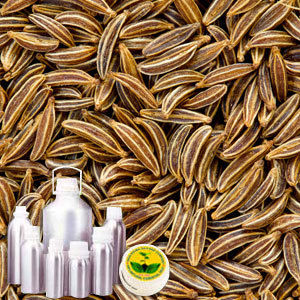Botonical Name | : | Carum carvi | |
CAS # | : | 8000-42-8 | |
Country of Origin | : | India | |
Color & Odor | : | colorless to pale yellow with a sweet spicy odor | |
Solubility | : | Soluble in alcohol and oils, Insoluble in water | |
Specific Gravity | : | 0.895 - 0.958 @ 20 °C | |
Optical Rotation | : | +57° to +82° @20 °C | |
Refractive Index | : | 1.485 - 1.492 @ 20 °C | |
Flash Point | : | 63°C | |
Plant Part Used | : | Seeds | |
Extraction Method | : | Steam Distillation |
DESCRIPTION:
Caraway fruits (erroneously called seeds) are crescent-shaped achenes with five pale ridges which are hydrodistilled to produce oil out of it.CONSTITUENTS:
Riboflavin (Vit. B2) 0.327 mg (22%), Niacin (Vit. B3) 4.579 mg (31%), Vitamin B6 0.435 mg (33%), Folate (Vit. B9) 10 µg (3%), Vitamin B12 0 µg (0%), Vitamin C 7.7 mg (13%), Vitamin E 3.33 mg (22%), Vitamin K 5.4 µg (5%), Calcium 931 mg (93%), Iron 66.36 mg (531%), Magnesium 366 mg (99%), Phosphorus 499 mg (71%), Potassium 1788 mg (38%), Sodium 168 mg (7%), Zinc 4.8 mg (48%).AROMATIC SUMMARY / NOTE / STRENGTH OF AROMA:
A middle note with a strong aroma, Caraway Essential Oil has a sweet spicy odor with a slight peppery smell.BLENDS WITH:
Soap, Spices, Medicine.COMMON NAMES:
Meridian Fennel, Persian Cumin.USES:
Caraway Seed oil is used as fragrance in soaps and as spice in recipes.


































